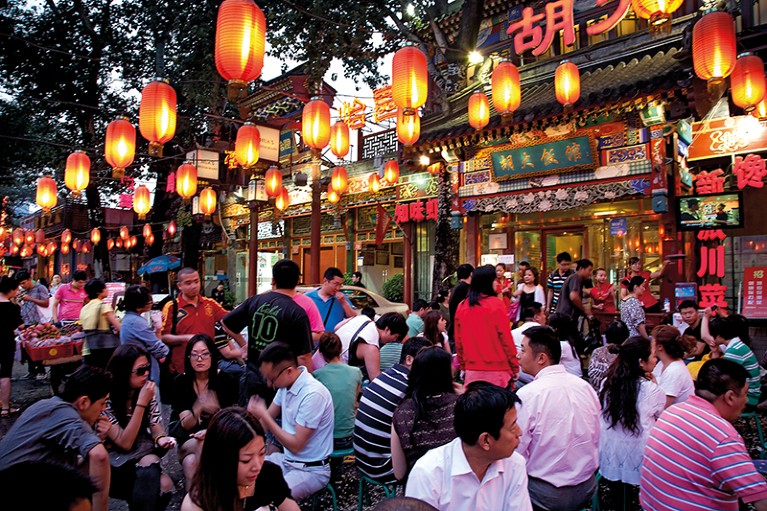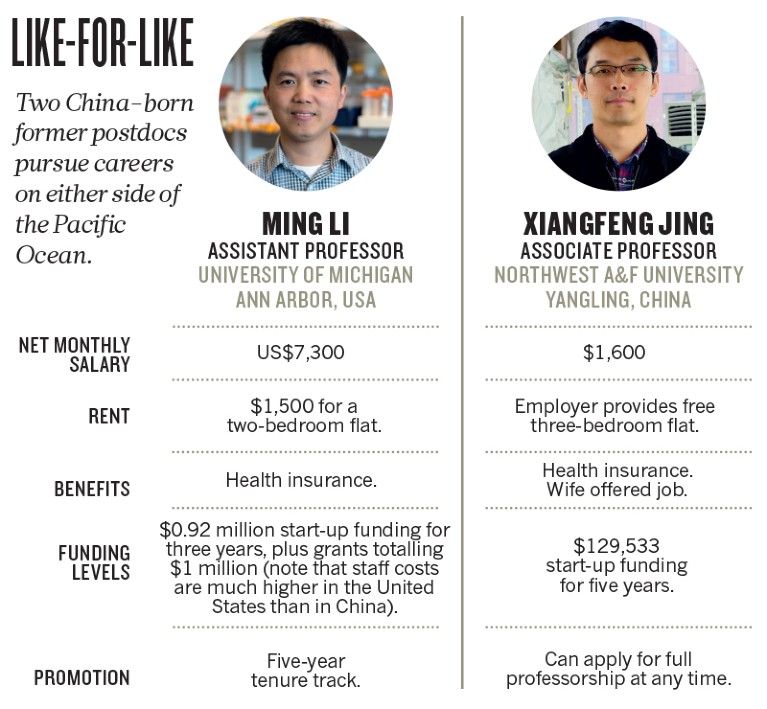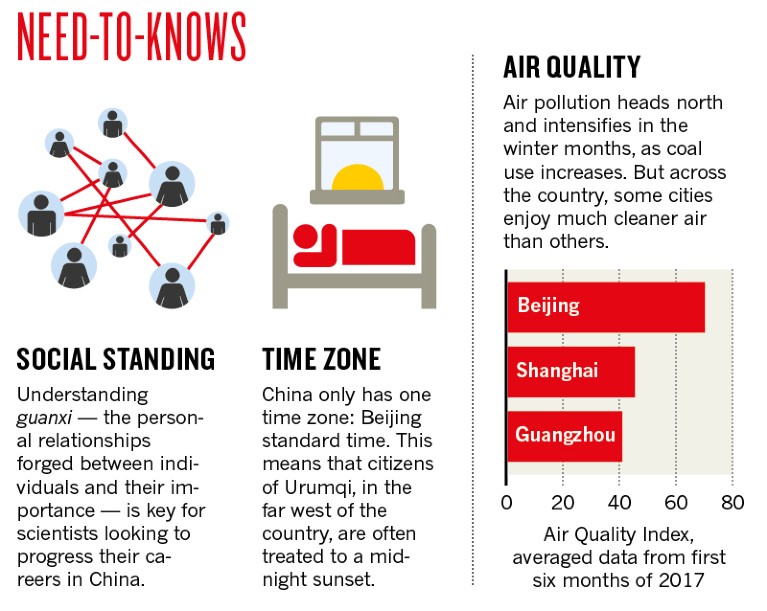
Beijing affords great opportunities, but is blighted by air pollution.Credit: Pictures Ltd/Corbis via Getty
China-born Xiaolai Zhou has temporarily given up the job hunt in his home country. The assistant professor at the Mayo Clinic in Jacksonville, Florida, discovered that finding his way into a professorship wasn’t quite as easy as he’d hoped, and now he’s having second thoughts. “Having been out of China for seven years, I missed my home and really wanted to return. But there are many personal factors involved in that decision,” says Zhou.
Like many others, Zhou thinks that professional opportunities in his native land have become as good as, if not better, than in the West. However, owing to intense competition, he has been able to secure neither a position at a leading university nor an equivalent salary and funding package. Now, he’s thinking twice about what the move would mean for him. “This move would mean I’d be nearer family and friends, but the United States remains the world leader in scientific research,” he says.
Zhou is one of tens of thousands of overseas-trained Chinese academics who are now considering coming home. Until the early noughties, China suffered a dramatic net talent outflow — of the 700,200 Chinese studying abroad between 1978 and 2003, only 172,800 of them returned — but the situation has gradually reversed. Over the past few years, 70–80% of Chinese students have come home after finishing their studies.
As China’s scientific recruitment scene becomes more competitive, returnees and overseas scientists need to be confident that they’re making the right decision.
Family commitments and the challenges posed by cultural differences are some of the major driving forces behind a desire to return. Guojun Shi, a cell biologist at the University of Michigan in Ann Arbor, says it can be tough for Chinese academics to compete against their Western colleagues. “In the Chinese workplace, it’s professional to be self-effacing, stress the insufficiency of your work and be deferential. But in America, to win research opportunities and resources, you must always stress your ability,” he says.
The choice to come home
Weiwei Deng was a tenured associate professor at Virginia Tech in Blackburg before joining the Shenzhen-based Southern University of Science and Technology through the Thousand Talents Plan in early 2017. “My daughter is seven years old. If we do not return now, it will be hard for my daughter to adapt to the Chinese education system later on.”
Others are eager to move closer to their relatives. Xiangfeng Jing chose to return to China after finishing his postdoctoral research at Cornell University in Ithaca, New York, because he wanted to be near his parents in the long term — despite concerns about missing career opportunities in the United States (see ‘Like-for-like’). “If you decide to return, the earlier, the better. China will not always have so many vacant positions waiting for you,” said Jing.

But swapping one culture for another can be tough. Physicist Ying Yan used to work at Lund University in Sweden, where academics with children over three months old can drop them off at publicly subsidized day-care centres. Now based at Soochow University in Suzhou, China, Yan finds the lack of support for early-year child care frustrating — in Chinese culture, family members are usually relied on to take care of their young children. Yan’s husband is a physicist at Shanghai University, so the couple depend on Yan’s mother-in-law to take care of their two-year-old son. “If we hired a nanny, that’s one of our salaries gone,” she says.
Returnee families are also frequently caught out by rules that prevent Chinese citizens from holding dual citizenship. For parents whose children were born abroad and hold two passports, trips out of China can involve elaborate planning to abide by visa regulations. A US passport, for example, is too valuable an asset to relinquish: the United States is the most sought after destination among Chinese citizens looking to emigrate, for reasons such as air quality, food safety and education. And some Chinese scientists, who have worked in the United States and obtained residency permits through their employers, worry that a move back to China will cause them to relinquish their residency status. Losing the freedom to work and live in the United States would be a harsh blow if the move to China does not go well and they choose to return.
Another widespread complaint among Chinese researchers is that some employers fail to keep their promises. Scientists are reluctant to speak openly on this subject, due to the potential for negative professional ramifications, but off-the-record examples include the failure of administrators to push through projects, such as setting up a lab, if they encounter resistance from other staff. In a country where an individual’s guanxi — social clout — is key to getting things done, few people risk their professional future by offending others (see ‘Need-to-knows’). Scientists also say the intense competition in Chinese research can drive unscrupulous behaviour. Neuroscientist Bai Lu of Tsinghua University in Beijing notes that colleagues are often reluctant to share their ideas for fear they might be stolen or published by others.

Source (air quality): US Department of State
The China experience
Foreign scientists working in China say that assimilating into local culture is a tough but rewarding task. Richard de Grijs, a Dutch astrophysicist who works at the Kavli Institute for Astronomy and Astrophysics at Peking University in Beijing, points out that nothing can be done without strong relationships on a practical and personal level.
“It takes a lot of effort to build up a network and be seen as a respected colleague; that’s not something you do overnight. I have established excellent relationships with a number of colleagues in the Chinese community, and we have become good friends on a personal level as well,” he says.
Living in Beijing means that de Grijs is no stranger to air pollution. China’s northern capital must often endure ‘airpocalypses’, or health-damaging levels of smog, which hit hard each winter. Despite government efforts to improve air quality by restricting factory emissions and toughening inspection procedures, China remains the world’s deadliest country for outdoor air pollution, which kills more than one million people a year. The heavily industrialized and colder northern regions are the worst affected. “China’s smog is a major problem and it’s taking too long to improve,” says de Grijs.
Scientists in the south are less affected by the dense smog. But there are other visible environmental concerns. For Joel Moser, a physics professor at Soochow University, the rising levels of water toxicity in Suzhou are worrying. Moser moved from Spain two years ago, where he was a researcher at the Institute of Photonic Sciences in Castelldefels. He says he was attracted by the opportunity of a professorship and higher levels of research funding. Suzhou is famed for its classically designed gardens and ancient water towns, but now the canals are heavily polluted. “Students tell me the dense algae in the water is still a recent trend. Some recall swimming in the nearby rivers not so long ago, when the water was still clear enough,” he says. “Obviously, finding a balance between economic growth and environmental protection is challenging. But Chinese people are resourceful, and they will find a way.”
A sense of anxiety about environmental living standards married with optimism for the future is common among foreign scientists. They point to the high levels of enthusiasm, talent and motivation of their students, warm reception from colleagues, and the affordability of smaller cities in comparison with their Western counterparts. “In the morning I often find fruits on my desk: a few bananas, an orange, and a handwritten note, which my students left as a token of appreciation,” says Moser.
Naturally, the language barrier is a daily struggle, but it is possible to make it work, says Zach Smith, an American optics expert at the University of Science and Technology of China (USTC) in Hefei. Smith’s decision to move was motivated by the offer of a ‘dual-hire’. He and his Chinese wife Kaiqin Chu, who studies the same field, found it difficult to find jobs at the same institution in the United States, but USTC was more accommodating.
Describing his approach to grant applications, Smith says: “Typically I write the grant first in English, and then get a lot of support from students and Kaiqin to help translate it. But of course it’s hard work because the language of grant applications is very specialized, and it’s tough to keep the meaning while at the same time re-working the tone and flavour to suit the tastes of Chinese funding agencies.”
Both returnees and foreigners learn to handle the role of politics in the life of a Chinese lab. Because most institutions are state-owned, all top-down decisions are understood to serve the needs of the ruling Communist Party. As such, it can be hard for scientists to openly confront perceived systemic failures without seeming to challenge the wider status quo. Scientists say they risk losing support for their work, and the chance for career advancement, if they speak out. They also complain that government bureaucrats make key decisions, rather than scientists, and expensive equipment purchases are made by unqualified administrators.
Foreign scientists report further troubles in China’s system, including struggles with rigid Internet censorship practices. Websites including Google, Facebook and Twitter are blocked in China; to use key research tools such as Google Scholar and to access research papers, scientists use VPNs (virtual private networks) to climb China’s Great Firewall. But VPNs are not always foolproof, as censors seek to block them.
“This is partly why I did not choose to work in China full-time,” says Olaf Wiest, who has been a visiting professor at Peking University for three months every year since 2010. “We must let potential job seekers have information on both sides, so that they can balance the gains and losses of coming to work in China.”


 How to find a job in China
How to find a job in China
 Putting China’s science on the map
Putting China’s science on the map
 Returning to a revitalized China after research abroad
Returning to a revitalized China after research abroad


